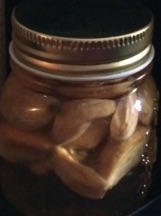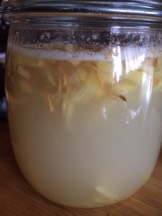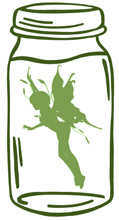Wild Dryad's Bugs in Jugs
Fermentation for gut health
Fermentation brings to mind the production of wine and beer. It is one of the oldest methods of preservation relying on wild bacteria and yeast. The most commonly fermented foods are made using Lactobacillus.
Lactobacillus bacteria convert sugars into lactic acid. Lactic acid is a natural preservative that inhibits the growth of harmful bacteria and increases the vitamin and enzyme levels while it improves the digestibility of the food.
The diets of traditional societies include many kinds of lacto-fermented food. Some of these include yogurt, sauerkraut, kimchi, ginger bugs, grape leaves, fruit, herbs, and root vegetables as well as fermented fish, and porridges made of soured grains.
Wild Dryad's Bugs
Diane Robinson is the Wild Dryad. She is a graduate of the BCIT Biotechnology program and the FoodShare WEFEAST program. She got her start in 1981 with a "mushroom tea" SCOBY and fun experiments with both wild foraged and garden crops.
Coming Soon Home Fermentation Kits
Lactobacillus bacteria convert sugars into lactic acid. Lactic acid is a natural preservative that inhibits the growth of harmful bacteria and increases the vitamin and enzyme levels while it improves the digestibility of the food.
The diets of traditional societies include many kinds of lacto-fermented food. Some of these include yogurt, sauerkraut, kimchi, ginger bugs, grape leaves, fruit, herbs, and root vegetables as well as fermented fish, and porridges made of soured grains.
Wild Dryad's Bugs
Diane Robinson is the Wild Dryad. She is a graduate of the BCIT Biotechnology program and the FoodShare WEFEAST program. She got her start in 1981 with a "mushroom tea" SCOBY and fun experiments with both wild foraged and garden crops.
Coming Soon Home Fermentation Kits
Fermented Garlic
This is easy to make and easy on the wallet but carries a big punch of flavour
Fill a sterile jam jar with peeled garlic cloves
Add enough unpasteurized liquid honey to cover the cloves
Cover with a clean cloth or coffee filter and fasten with an elastic band
everyday give it a swirl
Test after 30 days. The garlic will darken and become fragrant and the honey will become darker and runnier.
Use in cooking and to soothe a sore throat.

Ginger Bugs
Another easy to create probiotic
1 Litre or 1 quart sterile mason jar
2-3 tablespoons of grated or chopped ginger
Equal amount of real sugar of your choice (not honey or a sugar substitute
2 cups filtered water (bugs don't like chlorine)
stir everyday after the addition of an additional 2-3 tablespoons of ginger and sugar
Check everyday after the third day for a strongly bubbling yeasty smelling pet ginger bug. Add to sparkling water or bottle for secondary fermentation.

Diane Robinson is the Wild Dryad. She is a graduate of the BCIT Biotechnology program and the FoodShare WEFEAST program. She got her start in the ’80’s with a "mushroom tea" SCOBY and fun experiments with both wild foraged and garden crops.
